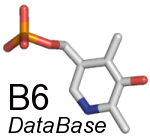|
|
| type |
Journal Article |
| authors |
Varadharajan S, Dhanasekaran S, Bonday ZQ, Rangarajan PN, Padmanaban G |
| title |
Involvement of delta-aminolaevulinate synthase encoded by the parasite gene in de novo haem synthesis by Plasmodium falciparum |
| journal |
Biochem J |
| Activity |
2.3.1.37 |
| Family |
2.3.1.37 |
| sel |
selected |
| ui |
12119044 |
| year |
(2002) |
| volume |
367 |
| number |
2 |
| pages |
321-7 |
| | |
|---|
| keywords |
5-Aminolevulinate Synthetase/antagonists & inhibitors/genetics/immunology/*metabolism |
| abstract |
The malaria parasite can synthesize haem de novo. In the present study, the expression of the parasite gene for delta-aminolaevulinate synthase (Pf ALAS ) has been studied by reverse transcriptase PCR analysis of the mRNA, protein expression using antibodies to the recombinant protein expressed in Escherichia coli and assay of ALAS enzyme activity in Plasmodium falciparum in culture. The gene is expressed through all stages of intra-erythrocytic parasite growth, with a small increase during the trophozoite stage. Antibodies to the erythrocyte ALAS do not cross-react with the parasite enzyme and vice versa. The recombinant enzyme activity is inhibited by ethanolamine and the latter inhibits haem synthesis in P. falciparum and growth in culture. The parasite ALAS is localized in the mitochondrion and its import into mitochondria in a cell-free import assay has been demonstrated. The import is blocked by haemin. On the basis of these results, the following conclusions are arrived at: PfALAS has distinct immunological identity and inhibitor specificity and is therefore a drug target. The malaria parasite synthesizes haem through the mitochondrion/cytosol partnership, and this assumes significance in light of the presence of apicoplasts in the parasite that may be capable of independent haem synthesis. The Pf ALAS gene is functional and vital for parasite haem synthesis and parasite survival. |
| last changed |
2017/10/24 09:43 |
|











